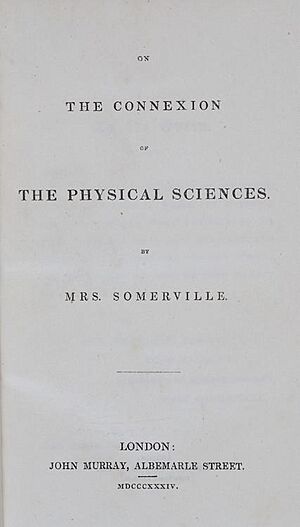Science book facts for kids
A science book is a special kind of nonfiction book. This means it's about real facts and events, not made-up stories. These books are usually written by scientists, researchers, or professors. Famous examples include Stephen Hawking's A Brief History of Time. Sometimes, people who aren't scientists, like Bill Bryson, also write them. He wrote A Short History of Nearly Everything.
Science books are written for a wide audience. They are for anyone who is curious and has a general education. This is different from scientific papers, which are for other scientists. Because of this, science books are often called popular science. Authors need to be very good at explaining tricky topics in a way that's easy to understand. They also need to be good at telling a story while sharing facts. In the UK, the Royal Society Prizes for Science Books are important awards for science writing.
Contents
What You Can Learn from Science Books
Science books help explain many different subjects to everyday people. They make complex ideas simple and fun to learn.
Exploring the Universe and Earth
- You can learn about astronomy and space from authors like Carl Sagan.
- Books by Jared Diamond can teach you about geography and how different places on Earth have shaped history.
Life and How It Changes
- If you're interested in evolutionary biology, authors like Stephen Jay Gould and Richard Dawkins explain how life on Earth has changed over millions of years.
- Donald Johanson's books can tell you about paleoanthropology. This is the study of early humans and their ancestors.
- Desmond Morris writes about zoology (animals) and anthropology (human behavior).
The Brain and How We Think
- David Eagleman writes about neuroscience, which is the study of the brain.
- Authors like Steven Pinker and Noam Chomsky explore linguistics (the study of language) and cognitive science (how our minds work).
- Donald Norman's books can help you understand usability and cognitive psychology. This is about how people interact with things and how we think.
Deep Space Mysteries
- For those fascinated by space, Fulvio Melia writes about amazing topics like black holes.
A Brief History of Science Books
The idea of writing about science for everyone started a long time ago. In ancient Greece and Rome, some poems tried to teach people about science.
The Age of Enlightenment
During a time called the Age of Enlightenment, many books were written. These books helped spread new scientific ideas to both experts and the public. But one book stands out as truly starting the modern popular science genre.
Mary Somerville's Big Idea
That book was On the Connexion of the Physical Sciences by Mary Somerville. It was first published in 1834. It was one of the first books to connect different science topics and explain them clearly for a wide audience.
 | Claudette Colvin |
 | Myrlie Evers-Williams |
 | Alberta Odell Jones |


